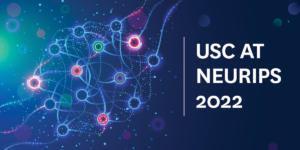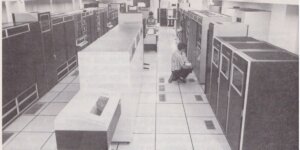
Gaurav Sukhatme and Ramesh Govindan are part of a USC Viterbi research team working on a major Internet of Battlefield Things project. (Photo/Michelle Henry)
On the battlefields of tomorrow, humans and technology will work together in a seamless, cohesive network, giving soldiers a competitive edge and keeping troops and civilians out of harm’s way.
The USC Viterbi School of Engineering has been selected to participate in an initiative to develop the scientific foundations of a next-generation Internet of Battlefield Things (IoBT), designed to enable new predictive battlefield analytics and services. USC Viterbi will receive $4.5 million of the $25-million project, led by the University of Illinois at Urbana-Champaign.
“This is a strong signal that USC has a high profile in Internet of Things research, said Ramesh Govindan, a network expert and the lead researcher on the four-member USC team. “We’re all extremely delighted to be a part of the winning effort and look forward to collaborating with some of the top researchers in the country.”
USC Viterbi engineers will work on “the next generation of army technologies for gathering intelligence and situational awareness from networked sensors in the battlefield,” said Govindan, the Northrop Grumman Chair in Engineering. They hope their findings could help improve battlefield tactical and strategic operations, he added.

Fei Sha (Courtesy Fei Sha)

Nora Ayanian (Photo/Michelle Henry)
In addition to Govindan, the USC Viterbi team includes Professor Gaurav Sukhatme, USC Viterbi’s executive vice dean of engineering and Fletcher Jones Foundation Endowed Chair in Computer Science, and Nora Ayanian, an Andrew and Erna Viterbi Early Career Chair in computer science, both experts in autonomous sensors; and Associate Professor Fei Sha, the Jack Munushian Early Career Chair and an authority in machine learning.
“Starting about two decades ago, before IoT became a buzzword, USC had a strong core of researchers in networked sensing,” Govindan said. “Some of us have been involved in the space since then.”
The Alliance for IoBT Research on Evolving Intelligent Goal-driven Networks (IoBT REIGN), funded by the Army Research Labs, includes collaborators from USC, the University of Illinois, Carnegie Mellon University, University of California, Berkeley, University of California, Los Angeles, University of Massachusetts and SRI International. The funding covers the first five years of a potential 10-year effort.
In the future, military operations will rely less on human soldiers and more on interconnected technology, leveraging advancements in unmanned systems and machine intelligence to achieve superior defense capabilities. The IoBT will connect soldiers with smart technology in armor, radios, weapons, and other objects, to give troops “extra sensory” perception, offer situational understanding, endow fighters with prediction powers, provide better risk assessment, and develop shared intuitions.
“This award enables a true collaboration between researchers at ARL and researchers in academia and industry to change the status quo in smart battlefield services,” said Tarek Abdelzaher, the academic lead of the alliance and a professor of computer science at Illinois. “Through ARL’s Collaborative Research Alliance model, we can change our fundamental understanding of what’s possible when computers, sensors, data, weapons, soldiers, wearables and media analytics are networked to empower new defense capabilities.”
In a battle environment, human operators must adapt to unexpected changes. IoBT researchers aim to create a cyber network of “things” that adapt as the mission evolves. That means that a system will have to analyze its available resources and re-assemble itself to best meet requirements for the present execution.
This effort to understand and exploit the unique capabilities of networked battlefield systems is an interdisciplinary problem that brings together researchers in cyber-physical computing, information theory, security, formal methods, machine learning, networking, control and cognitive science, among other disciplines.
Published on October 11th, 2017
Last updated on November 11th, 2022












